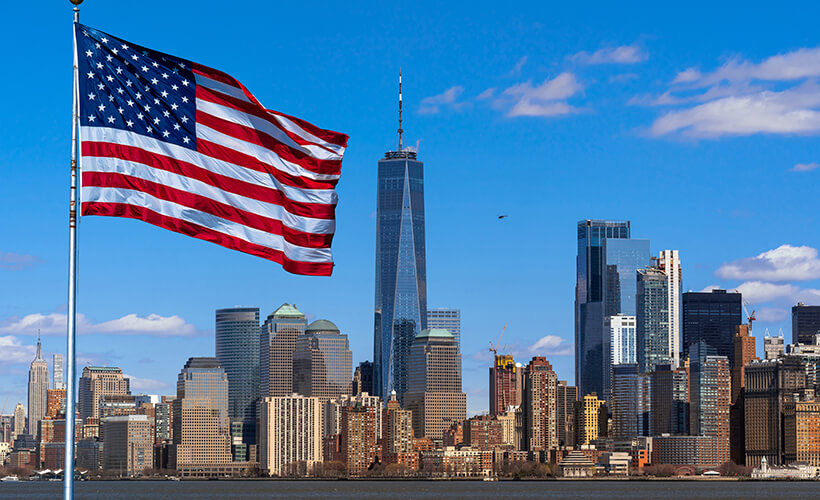The United States of America, often simply referred to as the United States or America, is a country primarily located in North America. It consists of 50 states, a federal district (Washington, D.C., the capital city), five major territories, and various possessions. The country is renowned globally for its economic, cultural, and political influence, making it one of the most significant nations in the world.
Geography and Climate
The United States is geographically diverse, encompassing vast landscapes ranging from forests, mountains, and deserts to urban centers. It is the third-largest country by total area and population. The contiguous United States, also known as the Lower 48, stretches across the North American continent from the Atlantic Ocean to the Pacific Ocean and shares borders with Canada to the north and Mexico to the south. Alaska, separated from the contiguous United States by Canada, is the largest state in area. Hawaii, located in the Pacific Ocean, is an archipelago southwest of the mainland.
The climate of the United States varies widely due to its size, geographic features, and weather patterns. Generally, it ranges from tropical in Hawaii and Florida to arctic in Alaska. The Great Plains in the central part of the country are known for their extreme temperature variations, while the Pacific Northwest is characterized by its wet climate.
History
The history of the United States dates back thousands of years with the arrival of Native Americans. The first European settlers arrived in the 16th century, and the country declared independence from Great Britain in 1776, forming a republic. The Constitution, adopted in 1787, established the federal government and the rights of citizens, becoming a model for democratic governance globally.
Throughout its history, the United States has experienced significant events such as the Civil War (1861-1865), which resulted in the abolition of slavery, and both World Wars, where it emerged as a global superpower. The country played a pivotal role in the Cold War and has been a prominent advocate for democracy and human rights worldwide.
Economy
The United States has the world’s largest economy, driven by diverse industries including technology, finance, healthcare, manufacturing, and agriculture. It is a leader in technological innovation, home to Silicon Valley and numerous Fortune 500 companies. The New York Stock Exchange and NASDAQ are among the world’s largest stock exchanges, reflecting the country’s economic influence.
The U.S. dollar is the world’s primary reserve currency, facilitating international trade and finance. The federal government plays a significant role in economic policy, with a mixed economy characterized by both private enterprise and extensive government regulation.
Culture
American culture is diverse and influenced by various ethnicities, religions, and traditions. It has made significant contributions to art, music, literature, cinema, and cuisine. The country’s cultural icons include Hollywood films, jazz music, Broadway theater, and fast food.
Sports are an integral part of American culture, with baseball, American football, basketball, and soccer among the most popular. The country hosts major sporting events like the Super Bowl and the Olympics.
Education and Research
The United States is renowned for its higher education system, with prestigious universities such as Harvard, MIT, Stanford, and others attracting students from around the world. It leads in scientific research and technological development, particularly in fields like aerospace, medicine, and information technology. Government agencies like NASA drive space exploration and research.
Government and Politics
The United States is a federal republic and a representative democracy, where elected officials govern according to the Constitution and laws enacted by Congress. The President, elected every four years, is the head of state and government. The legislative branch consists of the bicameral Congress, comprising the Senate and the House of Representatives. The judicial branch includes the Supreme Court and lower federal courts, responsible for interpreting laws and ensuring their constitutionality.
Foreign Relations
The United States plays a dominant role in global affairs, maintaining diplomatic relations with countries worldwide. It is a member of numerous international organizations such as the United Nations, NATO, and the World Trade Organization. Its foreign policy focuses on promoting democracy, human rights, and free trade while addressing global challenges such as terrorism, climate change, and economic development.
Challenges and Issues
Despite its strengths, the United States faces various challenges. These include socio-economic inequalities, racial tensions, healthcare reform, immigration policy, environmental sustainability, and cybersecurity threats. Debates over these issues shape national discourse and policy decisions.
Conclusion
In conclusion, the United States is a dynamic and influential country with a rich history, diverse culture, strong economy, and global impact. It continues to evolve, facing new challenges while maintaining its position as a beacon of democracy and innovation. Its contributions to science, technology, arts, and governance shape the modern world, reflecting its enduring influence on a global scale.
